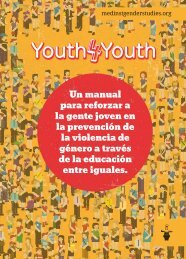react to domestic violence
react to domestic violence
react to domestic violence
Create successful ePaper yourself
Turn your PDF publications into a flip-book with our unique Google optimized e-Paper software.
Building a Support System for Victims of Domestic Violence<br />
evening, or on weekends where police stations are the only available and accessible service for victims, as that<br />
other government services, such as the Social Welfare Services, are closed. 32 Given that <strong>domestic</strong> <strong>violence</strong> is<br />
one of the most underreported crimes, the lack of available services on a 24 hour basis for victims that may not<br />
want <strong>to</strong> report <strong>to</strong> the Police at first instance, can be seen as a serious flaw in the system.<br />
Despite the Police being the first point of contact for victims, it cannot provide the kind of support and protection<br />
(psychological, financial support, legal support, information, empowerment etc.) required by victims<br />
beyond that of a basic level. 33 According <strong>to</strong> the Police representative, the psychological support of victims<br />
cannot be the responsibility of the Police when there are specific and specialized government agencies and<br />
NGOs who can provide such assistance. In his view, the role of the Police must focus on the effective criminal<br />
prosecution of perpetra<strong>to</strong>rs in order <strong>to</strong> secure convictions, and victim support cannot extend beyond that of<br />
‘primary support’ that will facilitate the taking of depositions and the gathering of evidence in order <strong>to</strong> substantiate<br />
cases in court. In practice, however, this depends on the availability and accessibility of family counsellors<br />
of the Social Welfare Services <strong>to</strong> respond immediately <strong>to</strong> requests for assistance, which seems <strong>to</strong> be<br />
currently lacking.<br />
According <strong>to</strong> the Police, the fact that 90% of <strong>domestic</strong> <strong>violence</strong> that are criminally investigated reach the court<br />
sends “a clear message as <strong>to</strong> the seriousness and rigour with which (the Police) approach the issue”. 34 However,<br />
it seems that this approach in itself is not sufficient <strong>to</strong> reach an expedient hearing of cases and ultimately <strong>to</strong><br />
the conviction of the perpetra<strong>to</strong>r as is clear from the poor conviction rates. Furthermore, as discussed above,<br />
attrition rates are extremely high, an issue which has yet <strong>to</strong> be addressed. Again, according <strong>to</strong> the Police, the<br />
problem lies with the weak victim support system:<br />
“Many <strong>domestic</strong> <strong>violence</strong> cases are suspended because of one vital fac<strong>to</strong>r, the deep deficit in the support<br />
framework for <strong>domestic</strong> <strong>violence</strong> victims. Once a case leaves the police, there is a question mark<br />
as <strong>to</strong> whether there is substantial support for the victim. It takes 1-2 years or more for a case <strong>to</strong> be<br />
completed. What happens <strong>to</strong> the victim during this time? Typically support and treatment exists but<br />
it is not structured in a specific context, with supportive structures <strong>to</strong> help the victim cope with the difficulties<br />
that arise after a complaint.”<br />
Representative, Domestic Violence & Child Abuse Office, Cyprus Police<br />
Another issue affecting the effectiveness of the Police in dealing with <strong>domestic</strong> <strong>violence</strong> cases is the lack of<br />
systematic training of all its personnel. In 2002 the Police established the Police Domestic Violence and Child<br />
Abuse Office as the competent department for the investigation of <strong>domestic</strong> <strong>violence</strong> cases, and the collection<br />
of statistical data. The Office includes a staff lawyer and a staff psychologist that provide assistance <strong>to</strong><br />
Police Stations all over the country. However, despite this positive development, this cannot close the gap in<br />
expertise among the Police. According <strong>to</strong> the evaluation of inter-departmental procedures, the Police do not<br />
have trained personnel in every police station, there is not always a woman police officer on site <strong>to</strong> take statements<br />
from the victim, and not all police officers are trained in taking statements by electronic means. The<br />
Association for the Preventing and Handling of Domestic Violence also confirms that Police officers do not<br />
always have sufficient expertise for dealing with victims. There also seems <strong>to</strong> be a lack of awareness and sensitivity<br />
among police officers which affects their handling of cases, with victims claiming that they have been<br />
ridiculed or not taken seriously when reporting incidents of <strong>violence</strong>. This directly affects victim confidence in<br />
the police which in turn affects the ability of the Police <strong>to</strong> initiate a criminal investigation, particularly when the<br />
victim is the only witness <strong>to</strong> the <strong>violence</strong>, which is often the case. Finally, this lack of awareness and sensitivity<br />
ultimately puts at risk the safety of the victim and her children.<br />
32 According <strong>to</strong> the Police, only 18% of <strong>domestic</strong> <strong>violence</strong> cases are reported during government working hours (07:30 – 14:30).<br />
33 Veis, C. (2010) ‘The Criminal Investigation of Domestic Violence Cases: Challenges and Issues’, Analysis Report, Inspection of Cyprus<br />
and European Law, Vol. 11, ∆ικαιονομία – Law Publishing, p. 6-11.<br />
34 Ibid, p. 6-11.<br />
17







